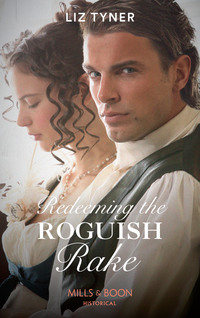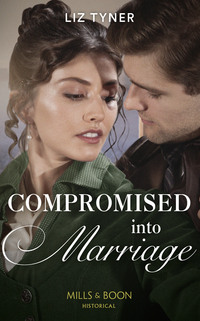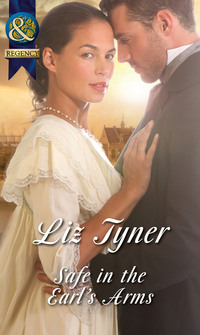
Полная версия
Saying I Do To The Scoundrel
The tavern owner and his brother tossed the solicitor out the door and Brandt grabbed the gold-tipped cane and stepped outside.
He held out the cane to the owner. The man took the cane and he couldn’t speak plain for the liquid in him. Brandt asked the man if he remembered where he lived. It took him a while to understand, but he helped him find his way back to his mother’s house. Brandt didn’t know why he’d done the kindness, but the man thanked him. Thumped him on the back and told him he was a good friend. Brandt told the man if he saw him at the tavern again, he’d buy the fellow enough ale so neither could walk.
The man laughed, offering his services if Brandt ever needed a solicitor. Brandt didn’t like the sound of that, but he gave the man a jostle to show he accepted the friendship and they parted at the man’s door, but not before Brandt asked the man if he might have some old clothing for sale.
The solicitor had charged twice their worth and reminded Brandt again that he’d be available should Brandt need more assistance.
Brandt didn’t want to go back to his room. He knew he wouldn’t be able to sleep, so he walked in the cool air, ignoring the scent of coal fires.
He also ignored the scent of the perfumery shop as he walked by it, but then he stopped, turned back and walked inside, the bundle of worn clothing under his arm.
The shop-owner heard the door, raised his head and peered at Brandt, then he recognised him.
‘Gardenia,’ Brandt said and he stared at the man. The shop owner didn’t speak. The older man took two steps to the left and pulled a scent bottle from a case and set it on the counter top.
Brandt walked to the man, took a coin out of his pocket, picked up the bottle and placed the coin in the exact same spot.
Brandt turned, put the bottle in his waistcoat pocket and left.
He stepped outside and for a second his feet refused movement. But he took a breath and strode towards his room.
Then, he stopped again. He couldn’t wait any longer. He reached into the pocket, pulled out his purchase, wrestled the clothing under his arm so that he could remove the bottle stopper and took in a savouring breath. Mary’s scent.
He wondered what Mary would have advised about the big-bonneted woman. He’d never seen eyes widen so when she first saw him.
He wagered she’d not get that picture from her mind easily. Not from the look on her face. His lips turned up. He didn’t think he’d ever shocked a woman so. Well, she shouldn’t have opened his door. Not before the sun set anyway.
That was his life now. Nights of drinking. Days of sleeping.
He felt the familiar ache. Felt the anger, the sorrow and the unfairness. Putting the stopper back in the bottle was easier than putting it on memories.
He didn’t like the early hours, but couldn’t pace the streets at night. Even in the morning, the fog could make his footsteps haphazard.
He’d walked the streets so many mornings until he could collapse into sleep that it had become a routine. Many of the merchants watched for him now, particularly when they needed help lifting something. At first they’d offered to pay him, and occasionally he took payment in goods, and he’d pass them along to someone at the tavern. But everyone knew not to talk with him much.
When the day began to warm and his feet hurt, he turned to his lodgings and let himself inside.
Brandt looked at the wall. He realised he didn’t know what day it was and he was not even sure of the month. He had lived like this for—how long exactly he didn’t know, but years. He had felt no life in him for such a long time.
And now some haughty high-born near-spinster wanted him to kidnap her from her father so she could take money from the man.
He didn’t know why he thought about her. She had a ridiculous criminal mind. Indelicate snorts. An uppity little nose. Layers of skirts which fluffed when she walked. Garments not weighted down with street crust. Probably smelled of sunshine from drying in the breeze.
He needed not to think about a spoiled heiress headfirst on her way to ruin.
And if he didn’t help her, she would gather speed on her downhill roll. Another man hired to kidnap her might not respect her upbringing.
He let out a deep breath, shut his eyes tightly and rolled his head back, cursing. Rage bubbled in him.
She should not have sought him out. She had no right to ask such a thing of him. Of anyone.
Then he remembered the fear in her eyes and the pause before she stepped inside her house. As if she had to force herself. He picked up a brandy bottle, drank from it deeply, but slammed the bottom on to the tabletop. He could not drink himself into oblivion and he couldn’t ignore someone who hated to walk inside such a house.
He stood and the fingers of each hand stretched out of their own volition, almost clawing, and he noticed the twitch.
The drink. No food. No sleep. His memories. He could not care for himself any longer and now this woman plagued him—wanting him to rescue her. How could he help another when he could not help himself?
Never in his life had he felt so trapped. Those damn lost eyes of hers kept appearing in front of his face.
He put his head in his hands and tried to breathe calmly. Blackness surrounded him and he didn’t think he could live much longer as he had, yet he had no wish to change his life. None.
But then he thought of his wife, Mary, and how he’d not been able to save her, and the rest of it.
A few shovels of dirt and life was to go on.
They’d shared their youth, their innocence, and he’d known he had to marry her. Fought hard to marry her. And what had it got her? A few shovels of dirt. And no life to go on. He would have traded places with her. Begged in the night hours to trade places with her, because without her, he was dead. At least one of them could live.
Helping Miss Wilder wouldn’t ease his loss.
But he might end with a rope around his neck, he realised, and pictured himself at his own hanging. He almost laughed. A rope would burn, surely, just as the brandy did at first. But he’d got used to the drink quickly. He supposed in the time it took to look at the sky, he could grow used to the bite of the rope, then he wouldn’t feel the caverns in his heart any more.
He’d not done much but traverse back and forth from bottle to bottle in the last few years. He’d heard his share of rude songs, and crude jokes and vulgar tales. They would still be there tomorrow. The day after tomorrow and the day after that.
The comfort of the tavern rested in its sameness. Even if the tavern closed, two more would take its place. He’d always have a bottle to hold him.
He took a coin from his pocket and flipped it up. He grabbed it from the air, slapping it on to the back of his hand, covering it with his palm. Heads, he’d kidnap her. Tails, he’d change his lodgings and forget he’d ever viewed her treacherous—innocent face.
He remembered her with such clarity it seized his thoughts. When her lashes flickered, it was as if feathery fans fluttered above her eyes.
He wondered how she looked when she laughed. If her chin quivered? If she tilted her head, or blushed?
But most of all, he wanted to see the hair she hid under a mountainous hat from a crazed milliner.
It was not right to think so. Not right to think of another woman besides Mary.
He stood there, hand covering the coin.
He slowly moved his palm away and squinted. Tails. Was it tails to take her, or tails to leave her be? He took the coin in his right fist and with his left, backhanded the empty brandy bottle hard enough so the glass smashed into the wall.
He took a breath and then flipped the coin again.
Конец ознакомительного фрагмента.
Текст предоставлен ООО «ЛитРес».
Прочитайте эту книгу целиком, купив полную легальную версию на ЛитРес.
Безопасно оплатить книгу можно банковской картой Visa, MasterCard, Maestro, со счета мобильного телефона, с платежного терминала, в салоне МТС или Связной, через PayPal, WebMoney, Яндекс.Деньги, QIWI Кошелек, бонусными картами или другим удобным Вам способом.









